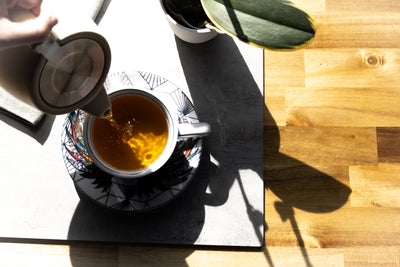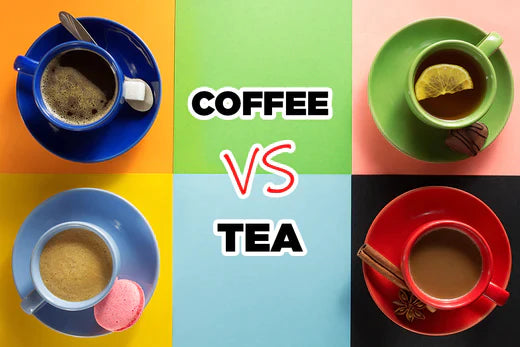Coffee vs Tea - Is Tea or Coffee Better for You?
The debate between tea and coffee lovers is a long-standing one, with each beverage having its own devoted followers. However, beyond personal preferences, the question remains: is tea or coffee better for you? In this post, we will discuss the potential health benefits and drawbacks of both tea and coffee and examine how they compare to each other.
1. Coffee vs Tea: Overall health benefits
Both tea and coffee, by themselves are considered ‘healthy’ beverages - that meaning they have additional properties besides plain water. Coffee and tea both contain antioxidants, which are chemical compounds that protect cells from free radicals. These free radicals ultimately can damage DNA, leading to cancer or other age related diseases. Both tea and coffee may help reduce inflammation.
2. Coffee vs Tea: Caffeine in tea and coffee
Both coffee and tea contain caffeine. Coffee averaging around 100-150mg per cup, with tea between 20-45mg per cup. (excluding caffeine free herbals).
Current FDA recommendations are to drink no more than 400mg of caffeine per day. Very high caffeine consumption can not only cause potential problems with irregular heartbeat, but also lead to anxiety and insomnia. It's no wonder that even the military calls for 'weak' coffee to maintain alertness.
Coffee should not be consumed in excess because of this. Tea allows additional consumption because of its lower overall caffeine footprint and thus provide both stimulation and boost awareness without consuming potentially harmful levels of caffeine. Moderate caffeine consumption will also help prevent a caffeine crash. Of course, if you choose herbal tea - most of these contain no caffeine at all.

3. Coffee vs Tea: Acid and digestion
Another side effect of heavy coffee consumption is potentially ingesting too much acidity which can affect the lining of the stomach and intestines. If you have digestion issues like gastritis and reflux, it may worsen these conditions. It can also worsen the symptoms of heart burn and indigestion.Tea is less acidic and therefore not prone to digestive side effects. In fact, there are a number of teas that can be used as digestive aids.
4. Coffee vs Tea: Anti-oxidants
Both tea and coffee contain antioxidants known as polyphenols. Numerous studies show polyphenols can help manage blood pressure levels and keep blood vessels healthy and flexible, promoting good circulation. They also help reduce chronic inflammation, another risk factor for heart disease. Polyphenols can reduce and help control your blood sugar levels
Additionally, there is a whole class of powerful anti-oxidants known as catechins. Catechins are a type of phenolic compound found in berries, tea, and cocoa. Previous epidemiological studies have suggested that tea could potentially possess a protective quality against various human cancers, including both colon and rectal cancers. Furthermore, the antimicrobial properties of the catechins in tea leaves play various roles within the digestive tract.

5. Coffee vs Tea: The good, the bad, and the ugly
While both beverages have health benefits, these are negated when doctored with unhealthy additions. Cream and sugar are the worst culprits.
With coffee, heavy use of cream and sugar, or specialty coffee drinks with caramel or other syrups often have huge sums of sugar and calories. These should be limited as an occasional indulgence.
With tea, the worst offenders are sweetened bottled tea beverages, sweet tea and boba (bubble tea).
For example, the American Heart Association recommends no more than 25 grams of added sugars per day for women, and 36 grams for men. One McDonalds Sweet Tea contains 40 grams of sugar (although employees say there is often much more). A Caramel Frappucino contains 54 grams of sugar.
5. Coffee vs Tea: Herbal Alternatives
While both coffee and tea have their benefits, there are other additional herbal teas that deserve consideration. There are many herbal varieties that contain numerous health benefits and have been used for centuries to address specific functions. There are also caffeinated herbal beverages like Yerbe Mate and Guayusa.
It's recommended that in order to get a good nights sleep, to avoid caffeine 6-8 hours before sleep. Therefore, trying caffeine free herbal beverages is a great way to get additional benefits without the
Coffee and Tea together?
Java Bean Tea
Switching from coffee to tea? Or are you a tea drinker looking for that authentic java flavor? Look no further - Java Bean Tea is the perfect tea for you! This pu-erh blend has real coffee with a hint of cocoa to give your palate the full range of coffee-inspired flavor. Try a longer steep time for stronger flavor.
"Being a coffee-to-tea convert recently, I have missed the caffeine jolt and overall flavor of coffee a bit... that is until this came along. This tea is incredibly smooth and has a hint of that coffee flavor I have grown accustomed to." -Jason
If you are tea beginner, we recommend starting off with darker teas like black tea. And try lots of samples! Or join the tea of the month club. Either way - you'll love all the choices the world of tea has to offer, even if you continue to drink coffee.





